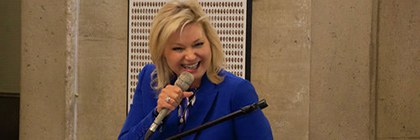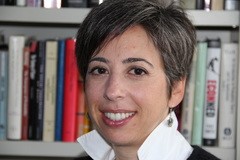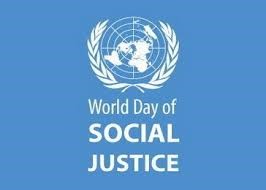Mississauga Mayor Bonnie Crombie provided McLaughlin College students with “gems of wisdom” when she visited the Keele Campus on Jan. 22, during the college’s First Year Student Dinner.
The event, which launched last year, recognizes first-year students as they make their full transition to university studies.
Other speakers at the dinner were:
- York University Chancellor Greg Sorbara, who chaired the formal program for the evening;
- Rhonda Lenton, York University president and vice-chancellor; and
- J.J. McMurtry, the newly appointed dean of the Faculty of Liberal Arts & Professional Studies.
Crombie, who is a York University alum and holds an MBA from the Schulich School of Business, spoke to students during a 40-minute address. She was introduced by Howard Brown, president of Brown & Cohen Communications & Public Affairs.

She began her keynote address by acknowledging those in attendance, saying, “This is a room full of power and potential,” and stating the students at McLaughlin College would undoubtedly “change the world throughout their lives.”
Crombie shared what she learned over her 40-year career in both business and politics, and pointed out that her own background and life experience is instructive.
“I am a first generation Canadian, born to Polish and Ukrainian parents in the 1960s in Etobicoke. My grandfather was a janitor at The Globe and Mail and my grandmother ran a rooming house,” she said, adding that her upbringing did not include “fancy vacations or dinners out,” but, it “made me the person I am today.”
She then went on to outline what she called her “10-point plan to succeed in your career,” which included:
- Number 10, always invest in yourself. Be a life-long learner and never stop learning.
- Number 9, listen. Be an active listener. It will allow you to connect with others, build trust and gain knowledge.
- Number 8, be humble and truthful. Those who are, ultimately, succeed.
- Number 7, be a life-long volunteer. Volunteer experience can be some of the most rewarding and satisfying things that one can do.
- Number 6, work hard. Crombie made the point of stating, “There is no substitute for hard work,” and noted that her mother told her when she was growing up that “if it is meant to be, it is up to me.”
- Number 5, do your homework. “If you know your stuff, you will get ahead,” she said. She noted this applies especially for women who must meet a “different bar” that necessitates that they must always be “over-prepared to get ahead.”
- Number 4, do not confuse being liked with being respected. Being respected, she noted, “requires hard work, doing your homework, and being principled and genuine.”
- Number 3, be kind. She made the emphatic point that, “Kindness sustains our humanity.”
- Number 2, failure is okay. Do not be afraid to take “calculated risks in your career.” You should not fear failure because it provides tangible lessons from which we can learn. “Be smart and thoughtful about the risks you take, but don’t hold back because you might fail,” she said.
- Number 1, do good. “If you’re not guided by a passion to do good – if selflessness and the common good are not your reason for public service – then please pick another profession,” she said. Doing good is essential to success in life.
Crombie concluded her address by stating she was happy to share her 10 points with the first-year students.
Those in attendance agreed it was a memorable First Year Student Dinner.

“It also left the students with ‘gems of wisdom’ that they could apply throughout their studies, careers and life,” said Milena Basciano, junior ambassador of the McLaughlin College Public Policy and Administration student association, who sat at the head table with the dignitaries.
“It was truly a remarkable evening,” said Matthew Ko, another McLaughlin College student ambassador, who was also seated at the head table.
McMurtry thanked Crombie, and said she provided a shining example and model for students who wish to aspire to important leadership positions within their communities. The City of Mississauga is one of the most dynamic multicultural urban communities in Canada, McMurtry observed.
He said Crombie is “demonstrating how engaged and inspirational leadership can make a significant difference realizing the goal of building a progressive community that unites and cares for all its members.”
All the program’s dignitaries were Fellows of McLaughlin College, which added to the cachet of the evening, and reinforced for all those in attendance, particularly, the students, the relevance and importance of their college affiliation.
The event also included a performance by the newly formed McLaughlin College Community Choir, led by Choir Director Sebastian Moreno.

McLaughlin College Head James Simeon recognized all the students’ work and efforts during their challenging first year of university studies. The first year “transition” to a new learning environment requires different skill sets, he noted, including a variety of assessment methods, expectations and demands from professors that can often be strenuous, but ultimately, entirely “transformative.”
Simeon also introduced Sorbara, and noted that all those who took the subway to the dinner, have Sorbara to thank, as he played a vital role in the subway being extended to the Keele Campus and beyond.
Sorbara said it was a 35-year campaign to realize the subway extension that began when he was the Ontario Minister of Colleges and Universities. At that time, he came to the view that Toronto’s two great universities, University of Toronto and York University, should be connected by the TTC subway system.
Lenton also addressed students, and encouraged them to continue working on mastering their new skill sets as they progress through their programs of study. She further made the point that universities play an integral role in the social, cultural and economic life of their communities.
















 Jennine Rawana is currently the Head of Calumet College and a faculty member in the Clinical Developmental Program in the Dept of Psychology at York University. She is also an executive member of the LaMarsh Centre for Child and Youth Research at York University and a supervising psychologist at the York University Psychology Clinic.
Jennine Rawana is currently the Head of Calumet College and a faculty member in the Clinical Developmental Program in the Dept of Psychology at York University. She is also an executive member of the LaMarsh Centre for Child and Youth Research at York University and a supervising psychologist at the York University Psychology Clinic.






